Intervention by the feds is justified, the letter asserts, “when a state uses its processes to intentionally deny a federal right, such as the precious right to vote.
"
The letter is signed by NAACP Chapter President the Rev. Wendell Anthony, general counsel Melvin “Butch” Hollowell and Executive Director Donnell R. White.
The Michigan Supreme Court heard oral arguments last week on the issue of whether a dispute over the font size of petition headings should prevent the proposed referendum from being placed on the ballot. After a 2-2 vote of the state Board of Canvassers prevented the measure from moving forward — despite the fact that far more valid signatures than necessary were collected — the Michigan Court of Appeals ordered that the measure should be allowed to go before voters.
A business group opposing the referendum, Citizens for Fiscal Responsibility, appealed that decision to the state Supreme Court, which has yet to decide whether it will take up the case. Meanwhile, the window of opportunity for the Board of Canvassers to place the measure on the ballot is closing. The deadline is Aug. 27.
“State of Michigan administrative tribunals and Michigan courts are using delaying tactics to nullify the right of the people of the state to exercise their federal right to vote during the November 6, 2012 general election, to repeal” the emergency manager law, formally known as Public Act 4, the letter says.
Efforts to keep people from voting on the law, which “strips duly elected officials of the executive and legislative duties and replaces them with unelected officials appointed by the Governor,” are clearly a violation of the 1965 Voting Rights Act, the NAACP officials argue.





